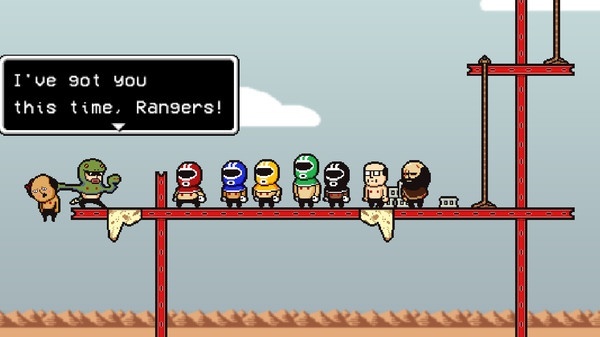Lisa (PC) Review
By Renan Fontes  23.11.2015
23.11.2015

Brad Armstrong is a man just like any other man in Lisa. He's cold. He's distant. He has a terrible history of pill and alcohol abuse that tore him apart inside, making him believe he was undeserving of love. He's also balding. Suffice to say, Brad isn't doing so hot. There is one thing that keeps him afloat, though: his adopted daughter Buddy. In a world where women literally disappeared off the face of the earth one day, Buddy stands as a beacon of hope for civilisation - or she would if Brad would share the fact she existed with someone besides his three, and only, friends. When they suddenly turn on him and kidnap Buddy, however, Brad's already miserable life spirals even further in a journey that explores what it means to be a man, a father, and a good person.
On the surface level, Lisa is very much reminiscent of SNES classic EarthBound. Both are turn-based RPGs in atypical settings, with a colourful cast of characters and a story that manages to be both silly, and poignant. Looking at Lisa in a more hands-on context proves there definitely were some influences from EarthBound in the game (most specifically the art style and funky soundtrack), but they couldn't be more different from one another.
To say Lisa is dark is an understatement. The premise alone is off-putting enough, with the men of Olathe chasing after a girl no older than 11, all with the sole purpose of repopulating a dying world. Brad's journey has him encountering addiction, mutilation, mass murder, molestation, suicide, and rape. What makes this all the more impactful is that it's often just in the background. Brad will walk into a new area and, perhaps, find a man who just recently killed himself hanging from a tree. While these moments are incredibly heavy and dark, it's important to note that they are not in poor taste. Lisa has shades of black comedy to it, often with death itself, but the darker themes are handled respectfully and are meant to show just how far civilisation has fallen without women.

Lisa does very little to explain what exactly happened to the women of the world. The only semblance of an answer is given in a completely optional encounter early on that refers to the event as the "White Flash," with no follow-up at any point and, honestly, Lisa as a whole is better off for it. This is not the story of the "White Flash." It's the story of Brad Armstrong, a man who struggled with addiction and an abusive father his entire life, having the only piece of joy in his life taken away from him. At its core, Lisa is a character study constantly asking the question, "How far will you go for the one you love?"
What makes Lisa so unique, gameplay-wise, from other RPGs of its style is its "choice" system. At multiple points in the story, Brad will be given a choice to make that will change how Lisa is played. These choices range from him having to give up all his items (a hefty price to pay given that his addiction has to be periodically fought off with "Joy," Lisa's drug of choice) or simply selling away a party member. As the story progresses, the choices get significantly more thought provoking and challenging, one particular moment forcing Brad to either cut off one of his arms, changing the way his combat is handled and permanently lowering all his stats, or permanently killing a party member - an equally heavy price given that EXP does not come cheap in Lisa. The choices affect very little story-wise, but they're not meant to; they're meant to invoke a feeling of loss and pain that only hammers in the hopeless atmosphere that permeates Olathe.

The combat of Lisa is typical JRPG fare: turn-based with some input here and there. Where the combat really shines, however, is with the use of strategy needed to get through Olathe. Brad has a total of thirty party members to choose from to aid him in his quest. All of them feature their own backstory and unique abilities that make them all viable. Some characters use a combo system where buttons have to be pressed in for a skill to be used, some don't inflict damage and only status effects, and in the case of one Birdie Hall, the plain "attack" option is replaced with a "drink" one, making the character take a swig of booze his turn, instead of fighting.
The key to survival is treating every encounter like a boss fight. Conserving SP and refusing to use skills is a sure-fire way to dying early and often. Lisa demands brutality, and expects Brad and company to go all out. After all, in an apocalypse, every encounter is kill or be killed. To further hammer in this idea of life and death, the victory fanfare is the same as the game over music, making the end of each battle solemn - a reminder that a life has just ended for, more often than not, little reason.
What makes Brad so interesting as a character is how different he is from other RPG protagonists. He is intentionally very grey; his desire to save Buddy comes from a good place, but his means of getting there is filled with violence, death and abuse. Brad's persona shows just how tight the writing in Lisa is and how well paced the story is.

There are three main areas, each one with several sub-areas that can be completed in any order, adding variety to each subsequent playthrough. The three main areas alone allow Lisa to follow the three-act structure perfectly - something many games fail at doing. Lisa has a very clear-cut beginning, middle and end, with no part dragging on too long or ending too soon.
Throughout his journey, Brad will sometimes trigger a flashback to the world pre-White Flash. These flashbacks are, for the most part, entirely optional, but they shine so much light on Brad's being. They're often cryptic, but not too cryptic where they are nonsensical and meaningless. Everything in Lisa has a purpose, whether it be to establish the world itself or the characters who inhabit it.
While the writing often can and will be chilling, the most praise Lisa deserves in terms of atmosphere is its music. Composed by the director of Dingaling himself with a trial version of FL Studio, it's outstanding just how perfect the soundtrack compliments the world of Olathe. There are incredibly clever leitmotifs and reprises, which, when noticed, can cause a visceral reaction. There are many cues taken from EarthBound musically, but it never feels like a copy. There is a clear identity in the music as there is in everything else in Lisa.

Cubed3 Rating
Exceptional - Gold Award

A game as powerful and poignant as Lisa doesn't come around often. It's challenging both gameplay-wise and emotionally, but it's rewarding in every regard. For all its death, Olathe is alive and full of interesting characters with their own stories, the music lingers and creates atmosphere that very few games can claim to have, and the story respects the perceptive and caring. Lisa is a game that deserves to be known and deserves to be played. Even with all of its challenging content, it's worth it. To quote one of Lisa's many NPCs: "Olathe... It's perfect."

![]() 9/10
9/10
![]() 0
(0 Votes)
0
(0 Votes)
 Out now
Out now  Out now
Out now  None
None  Out now
Out now Comments
Comments are currently disabled

 Sign In
Sign In Game Details
Game Details Subscribe to this topic
Subscribe to this topic Features
Features







 Top
Top

